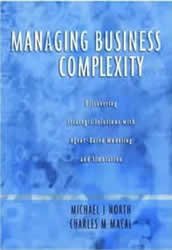
By North, Michael and Macal, Charles.
Oxford University Press: New York, NY, 2007
Reviewed by H. Van Dyke Parunak. Chief Scientist, NewVectors division of TechTeam Government Solutions, Inc
Recently Prof. Wang recommend me this book and let me find a new extension to my study: I didn't realize how widely "Agent-based modeling and simulation" has already been applied to business decision-making field.
Partial preface of this book
Agent-based modeling and simulation (ABMS), a way to simulate a large number of
choices by individual actors, is one of the most exciting practical developments
in business modeling since the invention of relational databases. It represents
a new way to understand data and generate information that has never been available
before--a way for businesses to view the future and to understand and anticipate
the likely effects of their decisions on their markets and industries. It thus promises
to have far-reaching effects on the way that businesses in many areas use computers
to support practical decision-making.
Managing Business Complexity is the first complete business-oriented agent-based modeling and simulation resource. It has three purposes: first, to teach readers how to think about ABMS, that is, about agents and their interactions; second, to teach readers how to explain the features and advantages of ABMS to other people and third, to teach readers how to actually implement ABMS by building agent-based simulations. It is intended to be a complete ABMS resource, accessible to readers who haven't had any previous experience in building agent-based simulations, or any other kinds of models, for that matter. It is also a collection of ABMS business applications resources, all assembled in one place for the first time. In short, Managing Business Complexity addresses who needs ABMS and why, where and when ABMS can be applied to the everyday business problems that surround us, and how specifically to build these powerful agent-based models.
What is ABMS?
"Agent-based modeling and simulation (ABMS) is a new approach to modeling systems comprised of autonomous, interacting agents. ABMS promises to have far-reaching effects on the way that businesses use computers to support decision-making and researchers use electronic laboratories to support their research. Some have gone so far as to contend that ABMS "is a third way of doing science," in addition to traditional deductive and inductive reasoning (Axelrod 1997b)".
"Computational advances have made possible a growing number of agent-based models across a variety of application domains. Applications range from modeling agent behavior in the stock market, supply chains, and consumer markets, to predicting the spread of epidemics, the threat of bio-warfare, and the factors responsible for the fall of ancient civilizations".
---- Abstract of "Agent-based modeling and simulation"
Questions came to my mind:
- What is the final goal to me with this study -- developing a general Agent-based simulation tool for decision makers, or providing consulting service within specific domain?
- This study is far more beyond modeling technique, it's extensively related to many fields, such as Business Intelligence (data warehousing, data mining, reporting), Artificial Intelligence, complex science, software engineering, project management, economics, psychology, etc. In this way, teamwork seems much better than individual efforts, then how to conduct research in this field?
